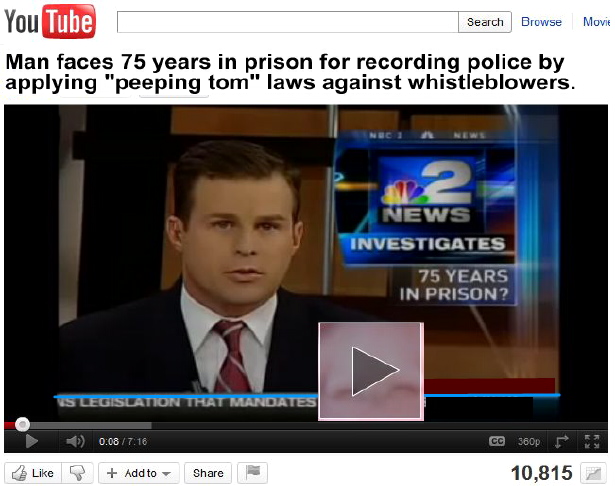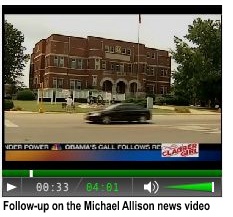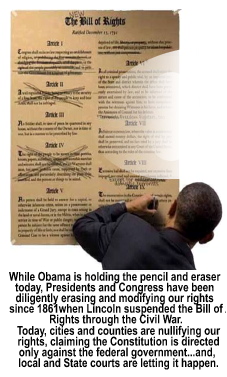
News
Behind the Headlines
Two-Cents Worth
Video of the Week
News Blurbs
Articles
Testimony
Bible Questions
Internet
Articles (2012)
Internet Articles (2011)
Internet Articles (2010)
Internet Articles
(2009)
Internet Articles (2008)
Internet Articles (2007)
Internet Articles (2006)
Internet Articles (2005)
Internet Articles (2004)
Internet Articles (2003)
Internet Articles (2002)
Internet Articles (2001)


![]()
Michael Allison, a Bridgeport,
IL resident is charged with five counts
of felony "eavesdropping" in Robinson, IL. What is "felony
eaves-
dropping?" Recording law enforcement officers, in a public place,
on
a tape recorder or cell phone as they verbally or physically assault US
citizens. Illinois is one of several States which has made it illegal
to
record police officers—in public—without their consent...even
if what
that officer is doing is beating up or verbally assaulting a subject.

Video-taping
or audio-recording on cell phones or any type of electronic devise is
now against the law in a dozen States including Illinois. States are fighting
back against citizens recording increasingly aggressive police behavior
(sometimes justified, sometimes not). In Robinson (in Crawford County),
Illinois, police arrested Michael Allison, 42, of Bridgeport, for committing
such a crime. Allison is now out on bail, preparing to stand trial on
five counts of felony "eavesdropping." Each count carries a
maximum penalty of 15 years in prison. Collectively, Allison is facing
75 years in prison for recording on duty law enforcement officials without
their consent. Law enforcement officers in Illinois can, however, legally
record "subjects" without their consent, and use those recordings
against them in a court of law. The penalty for "eavesdropping"
on a public official in Illinois is a Class I felony—the same as
rape. In reality, Illinois is using their old wiretap laws as a shield
law to protect public officials of all stripes from public scrutiny.
Allison recorded
the police when they stopped by his mother's house where he repaired old
cars. Allison said that when they drove up he decided it would be smart
to record the conversation with a cassette tape recorder. He wanted to
document his own words—as well as any threats he might receive from
them. That suggests Allison was aware that having unregistered cars on
his property was a violation of a local ordinances.  The
city eventually fined Allison and police confiscated the junk cars Allison
was restoring. During the court hearing, there was no court reporter,
so Allison recorded the proceedings himself.
The
city eventually fined Allison and police confiscated the junk cars Allison
was restoring. During the court hearing, there was no court reporter,
so Allison recorded the proceedings himself.
Robinson took his tape recorder to the Robinson Police Department and told the police chief that his officers were selectively enforcing the ordinance. Allison eventually filed a lawsuit against the city. When he filed his lawsuit, police showed up and confiscated his tape recorder. They also charged him with five felony eavesdropping charges, one for each of the five incidents he recorded.
Illinois is one of the States that dredged up and modified old wiretap eavesdropping laws to protect law enforcement officials from being videotaped and/or audio recorded as they potentially violated the rights of those they encounter in the line of duty. When NBC Channel 2 News attempted to cover the story and went to the Crawford County Circuit Court seeking an interview, a sheriff's deputy came out of a court room and asked the NBC news crew why they were recording. They were told to shut off their cameras. NBC said they could not even play the deputy's response to their answer to his question since "...we did not have his consent to record him. It was the same law that got Michael Allison arrested."
Videos and audio-recording protect the innocent as well as fingering the guilty. State legislator Chapen Rose was a prosecutor when cell phones became the vogue. He realized then that a problem might lie ahead for those who use them to catch cops and other public officials from abusing their authority. In Illinois and a dozen other States, audio and video recording has become a lopsided tool of the State—it can only be used against the other guy—meaning "John Q. Public," not "John Law."
The
US Court of Appeals for the 1st Circuit ruled unanimously on Friday, Aug.
26 that Simon Gilk had a legal right to videotape police "in action"
on Boston Common.  Gilk
sued the City of Boston for violating his civil rights after police arrested
him and charged him with illegal wiretapping (recording them). Gilk recorded
the officers beating up a suspect on his cell phone in October, 2007.
Gilk
sued the City of Boston for violating his civil rights after police arrested
him and charged him with illegal wiretapping (recording them). Gilk recorded
the officers beating up a suspect on his cell phone in October, 2007.
Police argued that the law protected them from having their words or actions recorded. The ACLU handled the case for Gilk. Police used Massachusetts statute (CH. 272, Dec. 99) that prohibits the secret, willful interception of any oral communication without obtaining the prior authorization of officials taking part in the recorded event.
Gilk was openly recording the beating and had no reason to believe he was violating any law. According to the ACLU's argument, the police violated Gilk's 4th Amendment right to not be arrested without probable cause, as well as his 1st Amendment right to observe and gather information about what the police were doing publicly in a public place. Gilk, by the way, is an attorney himself who understands what is or is not legal under Massachusetts law.
What we are experiencing today are cities, counties and even States, trying to circumvent the constitutional rights of the American people by erasing liberty by the inch, and amending those rights with pencil margin notes that can also be erased when the need arises.
The 1st Circuit's ruling upheld a Circuit Court decision that the City of Boston's wiretap law, Ch. 272, Sec. 99, which prohibits the secret, deliberate interception and retransmission of oral communications of public officials does not require "consent" if the interception is not secret and the actions of the official is public.
The dozen or so States which modified their wiretap and/or eavesdropping laws insist that those recording public officials must have permission to do so. According to the 1st Circuit Court there is a clearly established 1st Amendment right to film and/or audio record police officers performing their duty or abusing their authority in the public arena.
First Circuit Court Judge Kermit Lopez, speaking for the unanimous three-judge panel, rejected the claim of the Boston Commons police officers that they possessed "qualified immunity" since, they argued, wiretap laws are not yet well-settled. What the lawyers for the police meant was that their erasing a few words here and there in the Bill of Rights, and then penciling in a few new ones, has not yet been accepted as settled law. The 1st Circuit noted that the aegis of established case law affirms that the right to gather news is not a prerogative that belongs solely of the fourth estate today but, due to the Internet and the blogsphere, private citizens gather and disseminate the news as effectively and sometimes much more honestly than the mainstream news media.
What is most frightening about the Boston Commons and Robinson, Illinois audio and video recordings incidents is not the misconduct of the police officers or other public officials, it is two other things. First is the assumption of the public officials in Boston that the news media has no right to report what they say or do without the consent of the public officials. In other words, in the affected States, if the media receives audio or video proof that a public official has committed a crime, the media cannot reveal the content of those audio or video tapes without the consent of the public official whose misdeeds are therein enshrined. If the media publishes the sins of the public official, the journalist—not the official—will end being charged with a crime. The crime? Felony eavesdropping.
When Gilk was charged with felony eavesdropping for publicly recording the Boston police officers abusively arresting a suspect, he filed suit against the police under 42 USC 21 § 1983 (deprivation of civil rights and immunities secured by the Constitution and the Bill of Rights). As far as the 1st Circuit was concerned, the right of the public to openly (not secretly) video or audio tape public officials in the public capacity of their jobs, are protected by the 1st and 4th Amendments.

Copyright © 2009 Jon Christian Ryter.
All rights reserved.